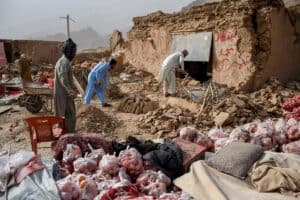The World Health Organization warned last week that less than a fifth of the country's health facilities remained fully functional, with two-thirds having run out of essential medicines.

Afghanistan’s health system is on the verge of collapse, a top Red Cross official warned Thursday, saying more than 2,000 health facilities had been shuttered across the conflict-ravaged country.
The International Federation of Red Cross and Red Crescent Societies (IFRC) warned that a dire lack of funding was pushing Afghanistan’s health system to the brink.
“People might agree to work without salaries for a few more weeks,” Alexander Matheou, IFRC’s Asia Pacific director, told a press conference in Kabul.
“But once medicines run out totally, if you can’t switch on the lights, if you’ve got nothing to offer somebody who comes to your clinic, then they’ll shut the doors.”
This video is no longer available.
Devastated by more than four decades of war, the Afghan economy has all but ground to a halt since the Taliban’s takeover last month, amid sanctions and a cutoff in foreign aid.
This has taken a particularly heavy toll on the health sector, which was primarily run by NGOs with internal funding before the Taliban came to power.
“Over 2,000 health facilities have closed,” Matheou told AFP at the end of a four-day visit to Afghanistan.
More than 20,000 health workers in the country were no longer working, or were working without being paid, he said.
More than 7,000 of them were women.
– Vaccines will expire –
The World Health Organization warned last week that less than a fifth of the country’s health facilities remained fully functional, with two-thirds having run out of essential medicines.
This could have dire consequences, including for the response to the Covid-19 pandemic.
In a country where only around one percent of people have received a vaccine, more than one million doses are waiting to be distributed.
They will expire by the end of the year, Matheou said.
The Afghan Red Crescent, which has been working in Afghanistan for decades including in Taliban-held areas during the insurgency, is part of the IFRC network and runs 140 primary health clinics across the country.
Those clinics, which have served around one million people since the start of the year, all remain fully functional and saw a surge of activity as other health facilities began closing down, Matheou said.
This video is no longer available.
It comes on top of a wide range of crises stalking Afghanistan, from drought driving severe food shortages to mass displacement.
The United Nations has said more than 18 million Afghans, over half the population, is in dire need of aid, while a third are at risk of famine.
The international community has pledged $1.2 billion in humanitarian aid, but it takes time for the funds to flow.
The Geneva-based IFRC appealed Thursday for 36 million Swiss francs ($38.5 million, 33 million euros) to deliver emergency relief and recovery assistance to more than half a million people in the provinces worst affected by severe drought and displacement.






